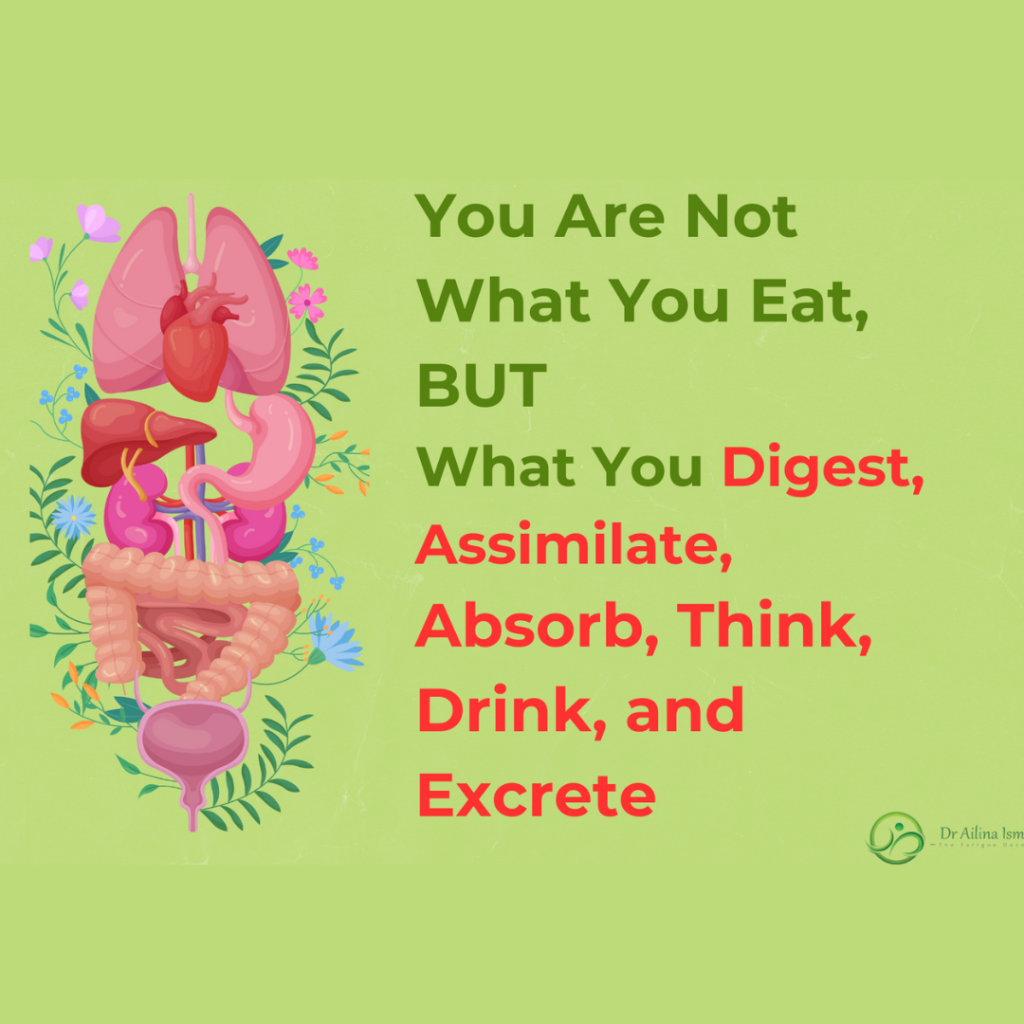
The Myth of “You Are What You Eat”
Many people focus on eating “healthy” without considering how well their bodies actually process that food. What you eat is only part of the equation—your body’s ability to break down, absorb, and use nutrients is what truly determines your health.
The Golden Hierarchy of Digestion
The body follows a structured process when it comes to digestion, and skipping steps can lead to poor health outcomes. Here’s what needs to happen, from top to bottom:
- Cephalic Phase – Digestion starts in the brain! The sight, smell, and even thought of food trigger digestive enzymes and stomach acid production.
- Chewing & Saliva Production – Breaking food down properly reduces stress on the stomach and intestines.
- Stomach Acid & Enzymes – Low stomach acid (hypochlorhydria) impairs digestion, bile flow, and microbiome balance. If this isn’t addressed, taking probiotics or gut microbiome tests alone won’t fix the issue.
- Small Intestine Absorption – The gut lining must be intact to properly absorb nutrients.
- Bile Flow & Detoxification – The liver and gallbladder help eliminate waste and regulate the microbiome.
- Gut Microbiome Diversity – Healthy gut bacteria thrive when the steps above are in place.
Many people invest in expensive gut microbiome tests but don’t feel better afterward because they never addressed upstream issues like stomach acid, H. pylori, pancreatic enzymes, or bile release.
Simple At-Home Gut Health Checks
You don’t always need expensive tests to get a sense of your digestive health. Try these simple checks:
- Chewing: Do you prefer chewing on one side of your mouth? Does your jaw (TMJ) feel restricted?
- Saliva: Do you have a wet tongue and bubbles under your tongue?
- Swallowing: Test your gag reflex—if it’s weak, your vagus nerve might need support.
- Tongue Health: Look for coating, cracks, or discoloration.
Butyrate: The Unsung Hero of Gut Health
Butyrate is a short-chain fatty acid produced in the gut that fuels the microbiome in every system—lungs, skin, and even the vaginal microbiome. If digestion is compromised, butyrate production suffers, affecting immunity, inflammation, and overall resilience.
Why Hydration Matters for Digestion
Your body is 45-75% water, and hydration isn’t just about drinking enough—it’s about drinking the right kind of water.
- Tap Water: Often contains contaminants like heavy metals, fluoride, and pharmaceuticals.
- Bottled Water: Beware of BPA and plastics leaching into the water.
- Filtered Water: Reverse osmosis is great for removing impurities but also strips beneficial minerals. Re-mineralization is key.
How Much Water Do You Need?
A simple formula:
- Convert your weight from kg to lbs.
- Divide that number by two (that’s your daily fluid ounces).
- Convert fluid ounces to milliliters.
Example:
- 52kg = 114.6lbs
- 114.6 ÷ 2 = 57.3 fluid oz
- 57 oz ≈ 1.7L per day
Hydration Hacks
- Add Minerals: A pinch of sea salt or fulvic acid restores electrolytes.
- Boost Detoxification: Add fresh lemon juice for vitamin C and liver support.
- Start Your Day Right: Drink 500ml of clean water in the morning.
✅ Today’s Challenge:
- Calculate your ideal water intake.
- Start your morning with 500ml of clean, mineralized water.
- Take one small step to improve digestion—whether that’s chewing more, supporting stomach acid, or managing stress.
Final Thoughts
If you’ve been struggling with digestion issues or have tried gut health protocols that didn’t work, consider looking upstream. Addressing foundational issues like stomach acid, hydration, and proper food breakdown can be the key to unlocking better digestion and energy.
Want to take it a step further? Take the Fatigue Decoder Assessment to see if hidden gut issues are draining your energy: Take the Quiz.
Or, if you’re ready for a deeper dive, book a call to get personalized guidance: Book a Call.
